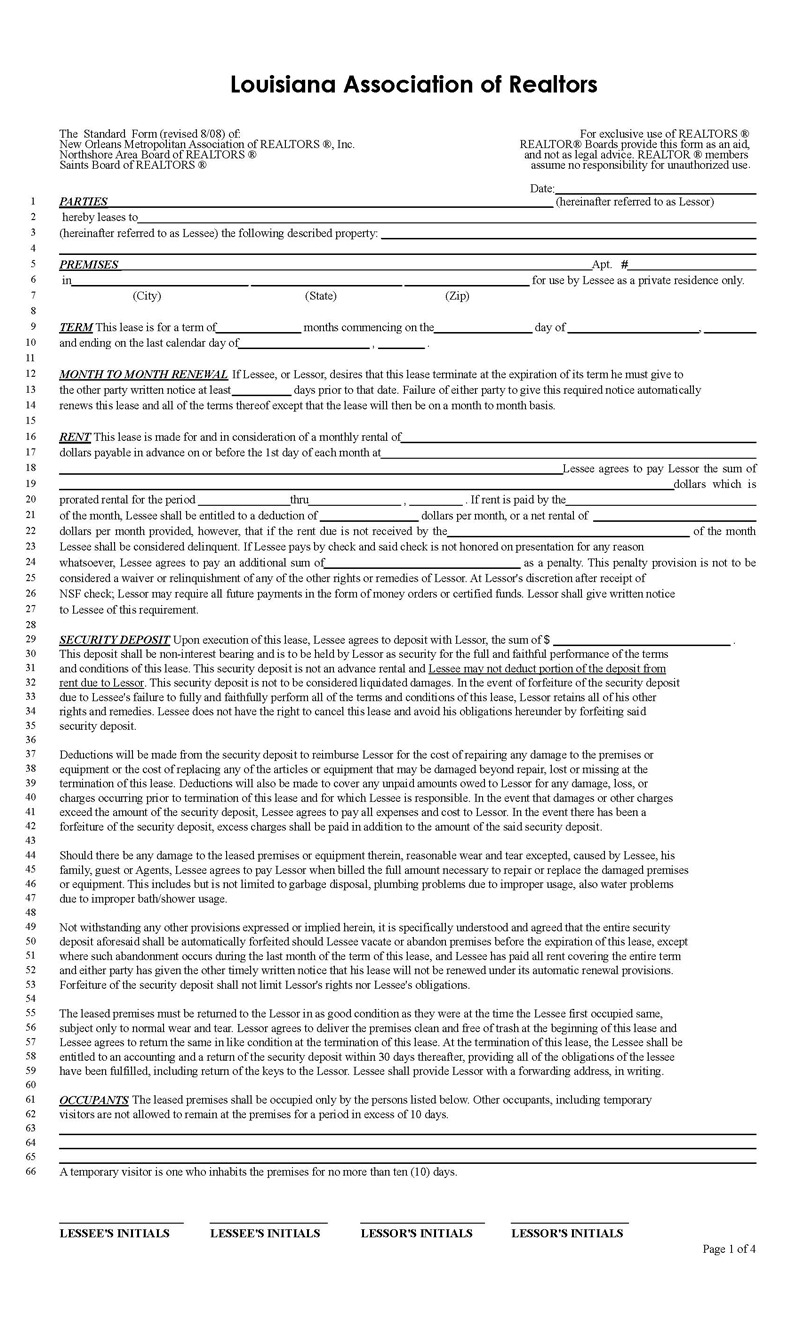A lease agreement in Louisiana is a legally binding contract between a landlord (lessor) and a tenant (lessee) that establishes the terms and conditions of the tenancy relationship between the two.
It can be either an oral or written document signed by both parties. Before starting a tenancy relationship, the landlord and tenant both have to agree on the terms they will abide by. A lease agreement sets out what is acceptable to each party. It serves as a record of the contract between the two parties, the obligations of each party, and what each party signed off on as acceptable at the start of the tenancy. It is extremely important in settling conflicts that may arise during the tenancy. By presenting it before any judicial authority, a resolution can be provided to a case regarding the violation of the contract made between the lessor and the lessee.
Lease Agreement Requirements in Louisiana
A lease agreement is a legal document regulated under law as outlined in Art. 2668 of the Louisiana Civil Code. Creating a valid lease requires abiding by the distinct impositions under Louisiana law for several aspects of this legal tool regarding what is allowed and what isn’t.
These are usually included as sections and must be accepted by both parties:
Landlord’s right of entry
There are no laws in Louisiana preventing a landlord from entering the rental property. Agreements limiting the landlord’s right of entry are best decided in the lease agreement to preserve the tenant’s privacy. An agreement for a 24-hour notice before the landlord can access the premises can be negotiated, but the landlord can come and go as he/she wishes.
In emergencies, a notice system agreed upon earlier can be waived. This includes situations in which someone is in immediate danger, property is in danger, or a crime is being committed. The landlord may access the property without prior notification in these situations.
Security deposits
The landlord of a rental property may request a security deposit before the tenant is allowed to begin occupancy. This sum of money also referred to as a damage deposit, is retained by the landlord to serve as a cover for defaults on rent payments or to cover physical damage to the property. There is no set limit in Louisiana for how much can be requested as a security deposit. Most landlords typically opt to set it at the cost of one month’s rent.
At the end of the tenancy, the landlord is obligated to return the security deposit to the tenant as specified in RS 9:3251. As the security deposit is intended to cover payment defaults and damages, the amount returned may be less than the initial deposit. If this occurs, the landlord must also provide an itemized list of the deductions. The only deductions for property damage made from the security deposit are limited to damages caused by the tenant or damages due to unavoidable disasters or vandals and do not include normal wear and tear. The deposit must be returned within one month after the lease terminates.
The tenant can forfeit a security deposit if adequate notice, as specified on the lease, is not given to the landlord before moving out. The landlord can use the security deposit to cover the rent for the next month if this occurs. If there is a dispute over the quantity of the security deposit returned, the landlord can be sued to recover the outstanding amount.
Lead paint disclosure
The United States government imposed a regulation in §4852(d) under Title 42 of the U.S. Code, which requires the landlord of any building containing lead paint to disclose this information to the person renting the property. The landlord must provide the lessee with a lead hazard information pamphlet, disclose the presence of any known lead paint along with lead paint hazards, and allow the lessee 10 days to conduct a risk assessment of the lead paint hazard.
For any building constructed before the year 1978, disclosure of potential lead paint hazards in the building is mandatory, even if there is no known location of lead paint on the premises. This is due to the high use of lead paint during this period, which may exist even in unknown locations, and the high danger posed by lead paint, especially to children.
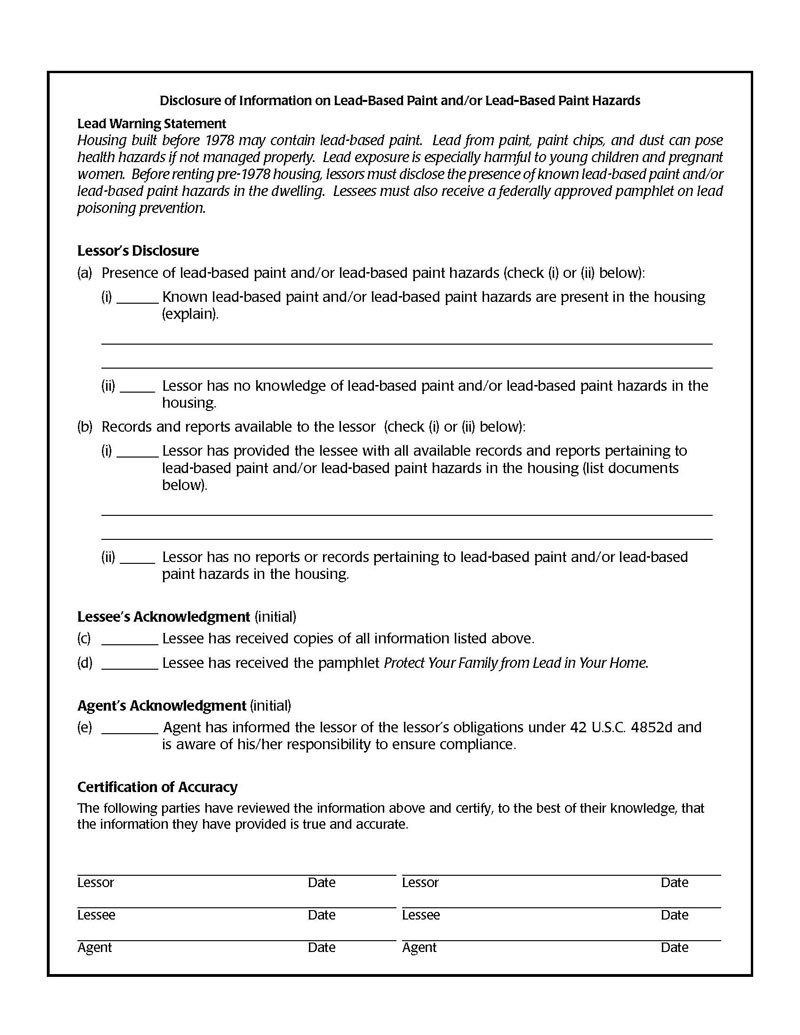
Notice of the termination
Articles 2720, 2721, 2723, and 2728 of the Louisiana Civil Code put forth the requirement for both parties in a tenancy relationship to be notified of the termination of the lease. This protects both parties from the loss of privileges that might occur if the contract is ended without their knowledge. For leases established for a fixed duration, there is no requirement for a notice of termination at the end of the lease.
Leases for which no expiration term is specified in the initial agreement must be terminated with due notice by the party ending the contract. Louisiana law specifies the minimum duration before the termination of a lease for which a notice must be given by the party terminating the lease.
These durations are set for in Art. 2728 as at least thirty calendar days for a lease whose term exceeds one month, at least ten calendar days before the end of the month for a month-to-month lease, and at least five calendar days for a lease whose term is at least one week but less than a month before the end of the term of a lease for a period shorter than a week.
Domestic violence
The laws of the state of Louisiana protect both the lessor and lessee regarding cases of domestic violence. RS 9:3261.1 provides the regulations covering a lease agreement regarding domestic violence victims and the conditions under which the lease can be terminated by either party. This law prevents domestic violence victims from being discriminated against in obtaining housing and gives such victims the leeway to request law enforcement officers as needed without being penalized for it. This law also protects the lessor from domestic violence situations in which other residents’ safety or peaceable possession can become a concern.
Under this law, a lessee cannot be denied housing solely because the person is a domestic abuse victim, but the lease can be terminated under certain circumstances. As previously stated, this can happen if a situation develops as a result of a domestic violence occurrence that leads to concern for the safety or peaceable possession of the premises. In this instance, the lessee can be evicted, even if the presence of the abuser is uninvited or unwelcome by the lessee. The lessee is also required to provide the lessor with reasonable documentation of the domestic abuse on or before the date of the lease application, lease termination, lease nonrenewal, or before the judgment or order of eviction is rendered.
For domestic violence situations that do not meet the previously stated safety or peaceable possession criteria, the lease cannot be terminated if documentation is presented. This particularly applies to situations in which the sole reason the eviction notice was issued was due to a single act of domestic violence.
Repairs
The need to repair some part of the rental property may arise during the period of occupancy of the lessee. The law of Louisiana, as set forth through Art. 2690 to Art. 2695, lays out the regulations for how repairs are to be conducted on the rental property. The lessor is responsible for making all repairs that keep the rental property in suitable condition for continued habitation. The lessee is responsible for making repairs for any damage he/she causes and those caused by persons permitted to be on the property. The lessee is also to make repairs resulting from the deterioration caused by normal use or to any other agreed-upon extent.
The lessor has the right to make repairs to the rental property, which might cause inconvenience to the lessee or a complete inability to use the rental property if the repair is essential and cannot be postponed to the end of the lease. If this happens, the lessee can obtain a dissolution of the lease. If a lessee requests the lessor to perform a necessary repair, which the lessor fails to do, the lessee can cause the repairs to be made. The lessee can request reimbursement of the repair from the lessor or apply the amount to the payment of the rent. The amount paid by the lessee for the repair must be reasonable.
The lessor is prohibited from making alterations to the rental property, which amounts to more than necessary maintenance during the duration of the lease.
Free Templates
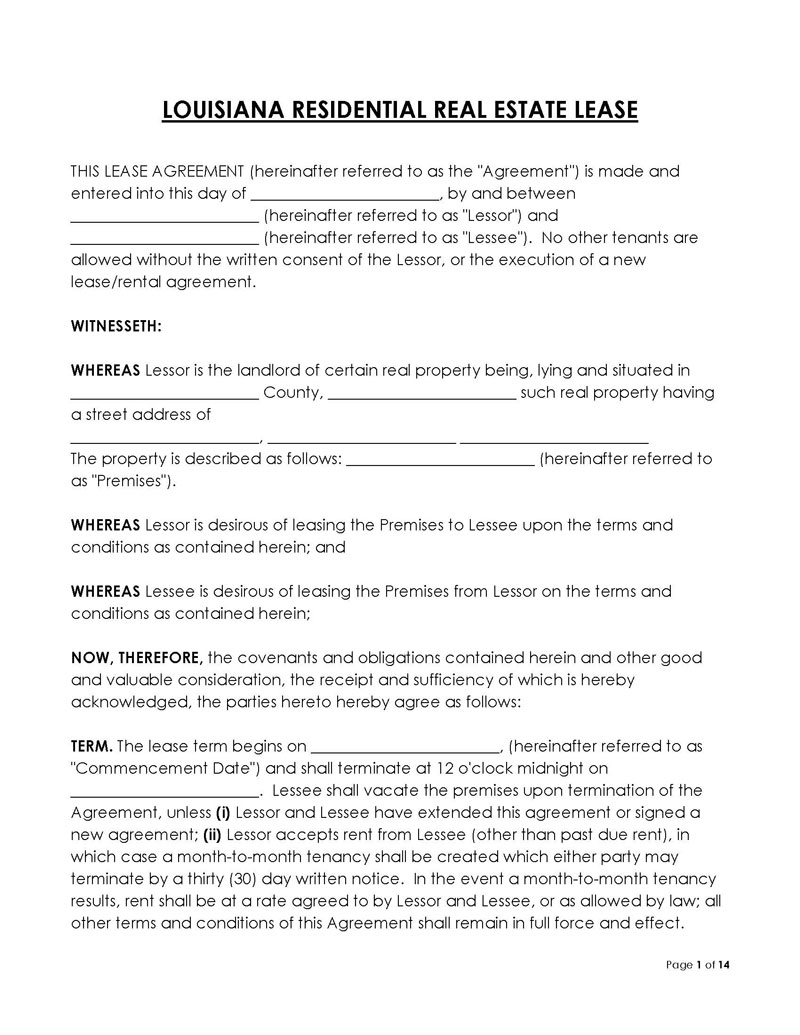
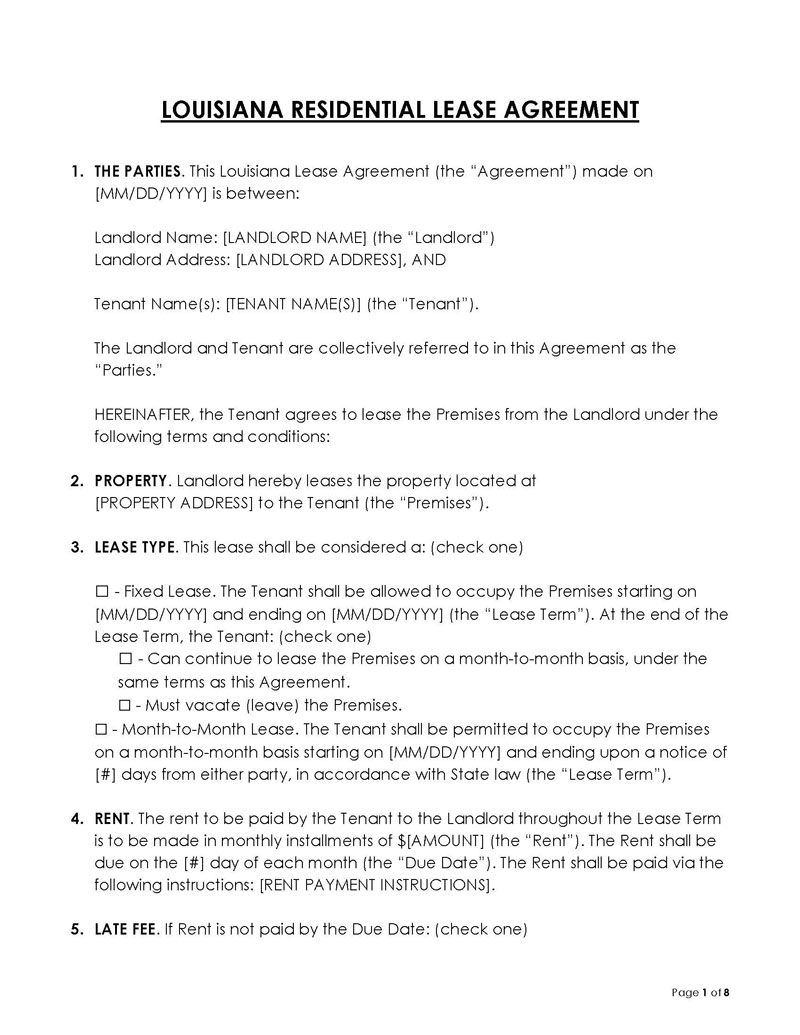
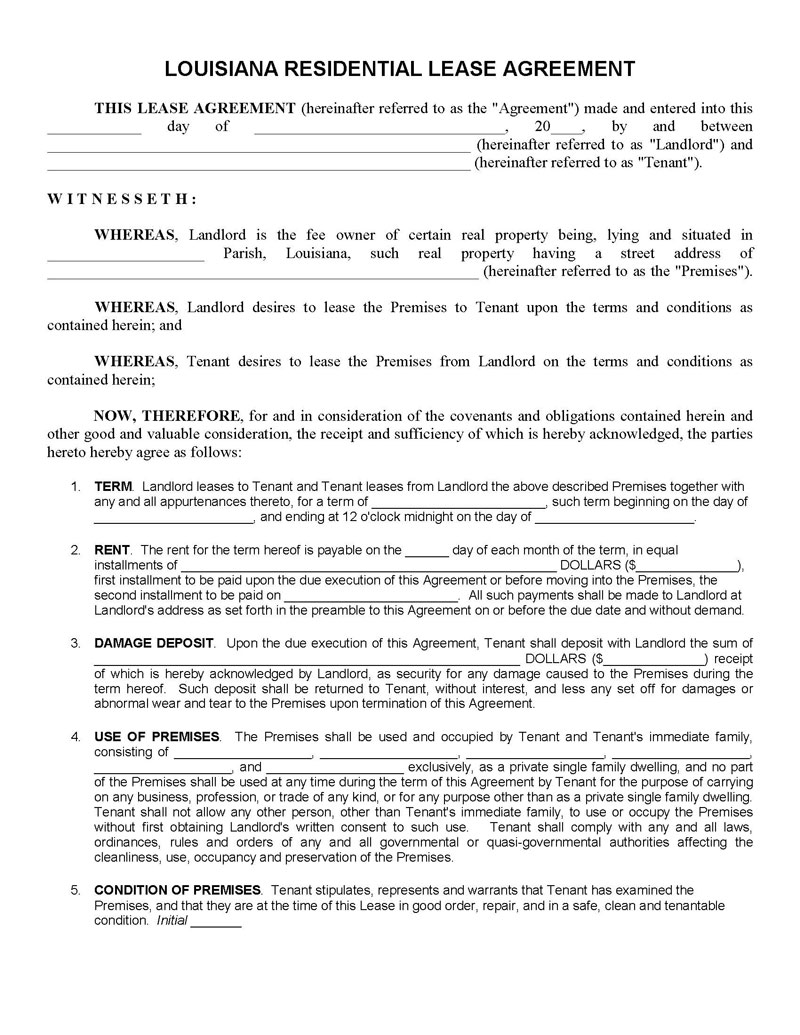
Rental Lease Agreements Used in Louisiana
There are different kinds of lease agreements that can exist between two parties for the use of a rental property.
These are as follows:
Association of realtors
This is a lease agreement drawn up with a tenant on behalf of the landlord by a licensed realtor. In this case, the landlord may not have any interaction with the tenant before the agreement is signed. The realtor organizes the visit of the tenant to the premises, negotiates the terms of the lease, and verifies the tenant’s information. The realtor will obtain the signatures of the landlord and tenant on the lease and provide his/her name, company name, phone number, and I.D. on the agreement. The realtor will typically be paid a commission for their services.
Commercial
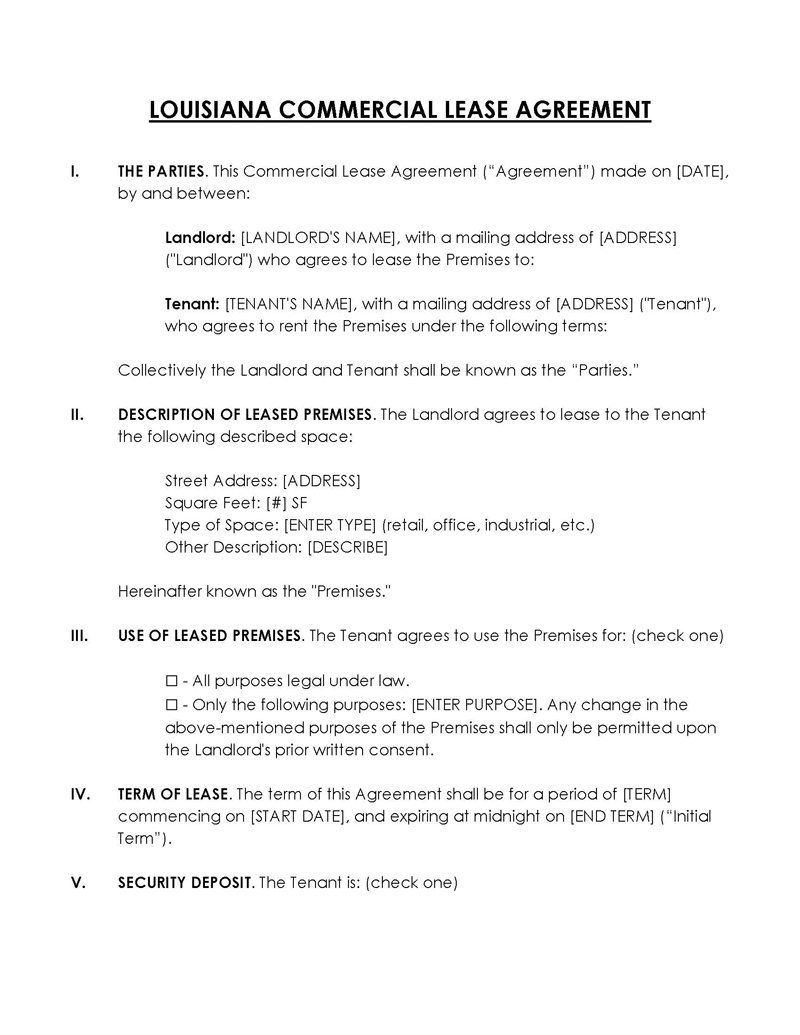
A commercial lease agreement is used for renting out a property on which the tenant wishes to conduct business. This includes spaces to house an office structure, a retail location, or an industrial area.
Month-to-month
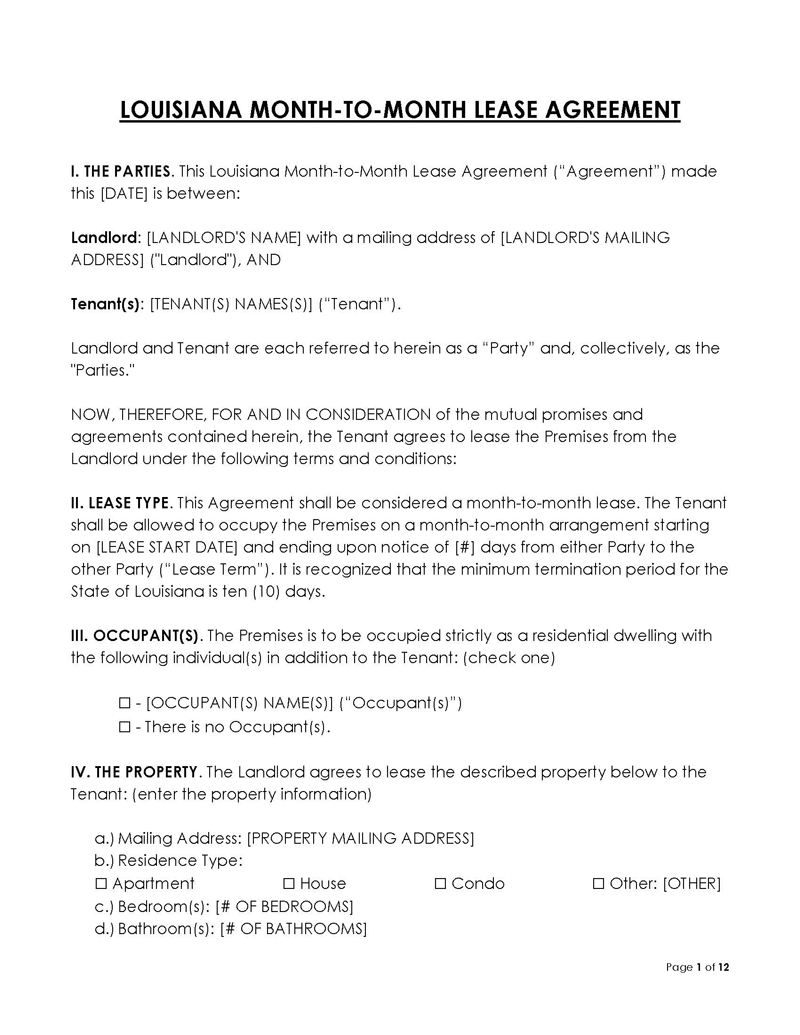
A month-to-month lease agreement establishes a tenancy relationship for thirty days at a time, which is renewed every time the rent payment is made and ends whenever any party terminates the contract or the lessee fails to pay.
Rent-to-own
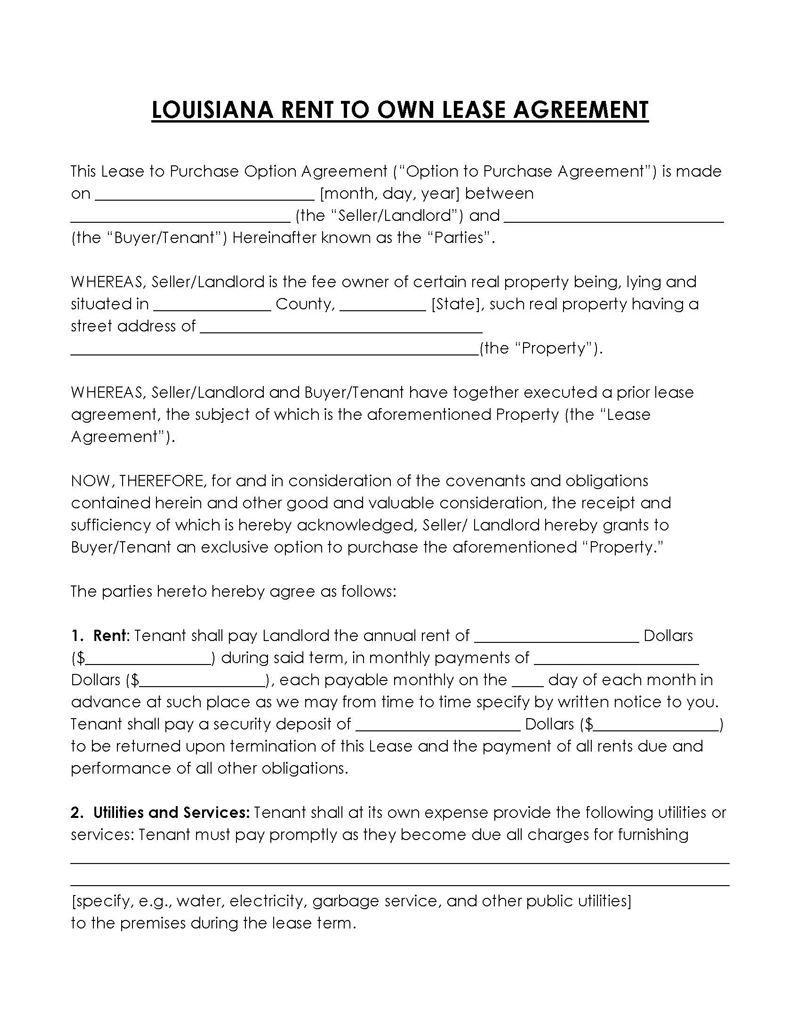
A rent-to-own lease agreement is used in tenancy relationships in which the tenant wishes to occupy the rental property for a period, with the option of purchasing the property at or before the end of the lease. The purchase price of the property will be negotiated and agreed upon at the start of the lease. The fee can be paid upfront or overtime as part of a higher-than-normal rent, which will go towards the down payment for the property. The tenant can choose not to purchase the property at the termination of the lease, and the landlord is not obligated to make a refund of whatever payment has already been made.
Roommate
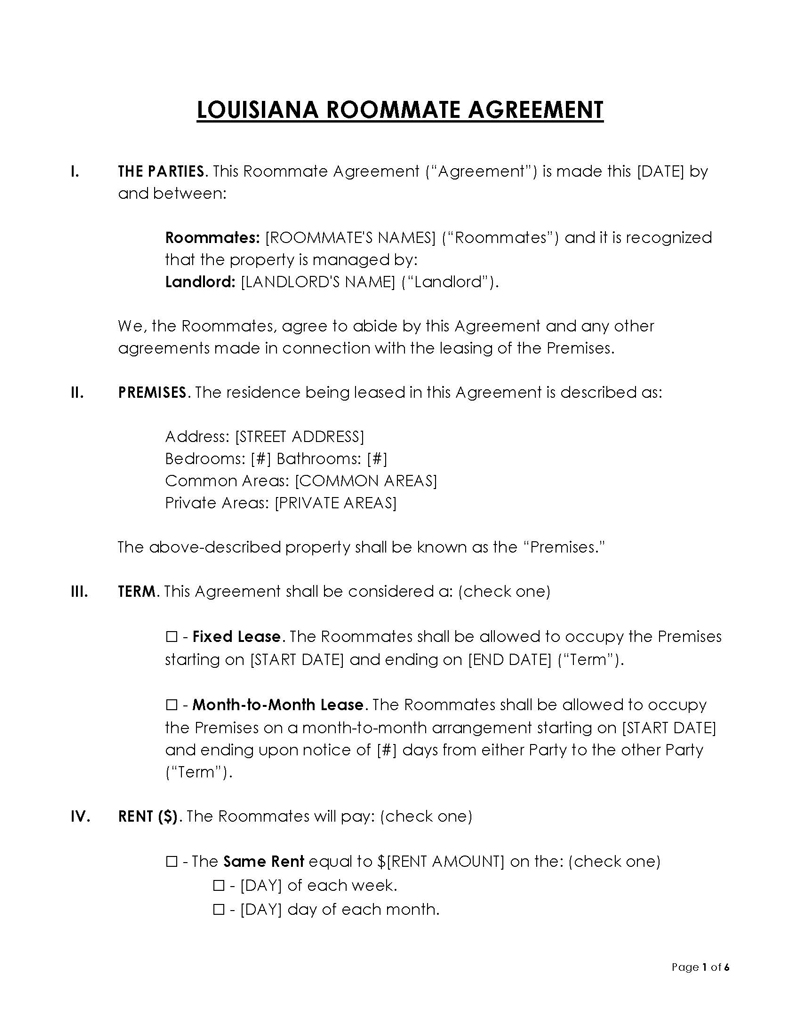
A roommate lease agreement is similar to any other type of lease agreement, except that it is signed by more than one person as the lessee. This type of lease is used when more than one person wishes to rent the property. The terms bind all persons who cosign as the lessee on the rental property, and any of the lessees can be held accountable.
Standard residential
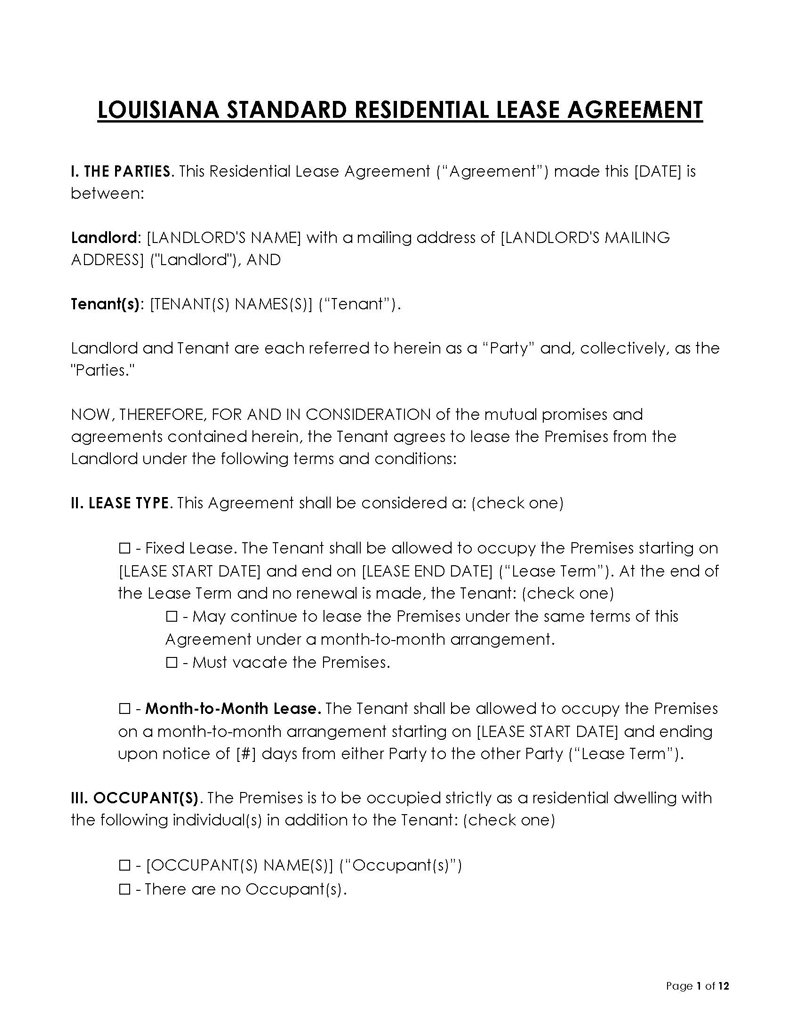
This is the typical contractual agreement established between a tenant and a landlord for renting a living space. The lease will include a description of the property, the security deposit to be paid, the monthly rent, the duration to cover, and the obligations of each party. This type of lease only authorizes the tenant to reside in that space. Using the space for operating a business can be seen as a violation of the lease terms.
Sublease
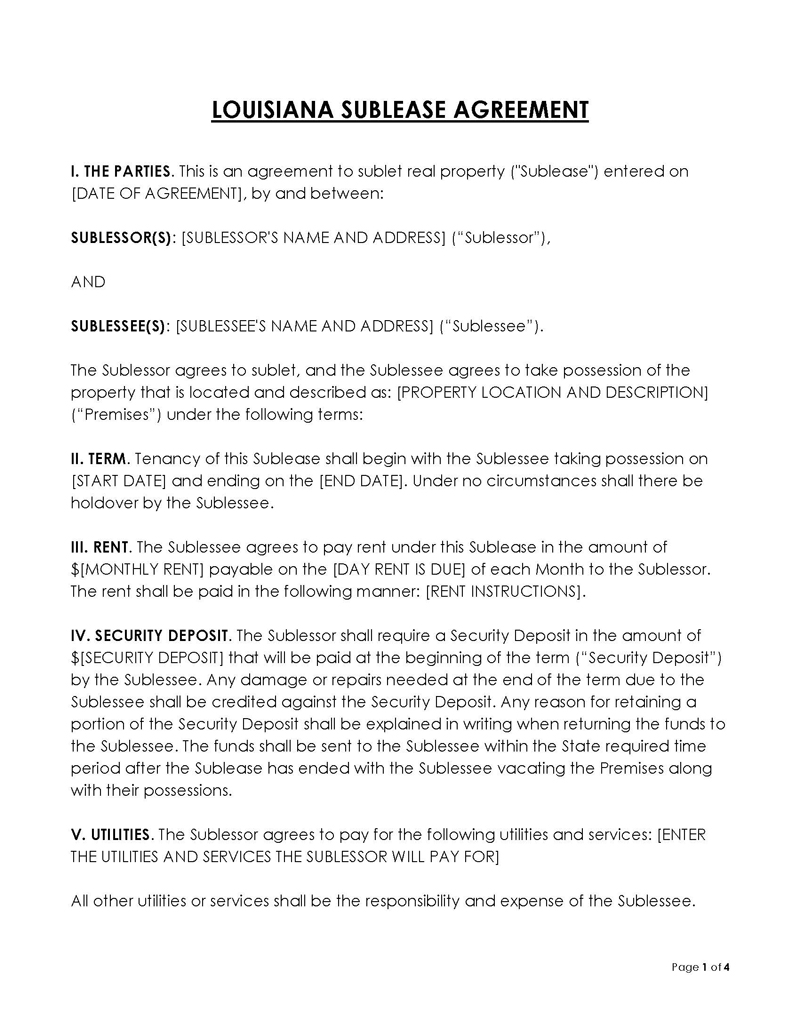
A sublease agreement allows the current tenant of a rental property to lease out that same property to someone else. This new agreement exists between the tenant and a subtenant and is subject to the main tenant’s original lease terms, privileges, and limitations. The sublease must be signed by the main tenant and subtenant and approved by the landlord. Drafting one from scratch can be a tedious process to undertake alone, and making a mistake on a lease agreement can have far-reaching ramifications, allowing for undeserved liberties. We provide carefully drawn templates for different types of leases that can guide you in creating yours, saving you time and reducing the chances of error.
Final Thoughts
Lease agreements are useful for outlining the terms on which a tenancy relationship will be built. Getting the terms right and addressing every aspect of the tenancy is what defines a good lease agreement. Protect yourself and your interests by using the right type of lease, and you can follow our templates to start creating your binding lease contracts.
